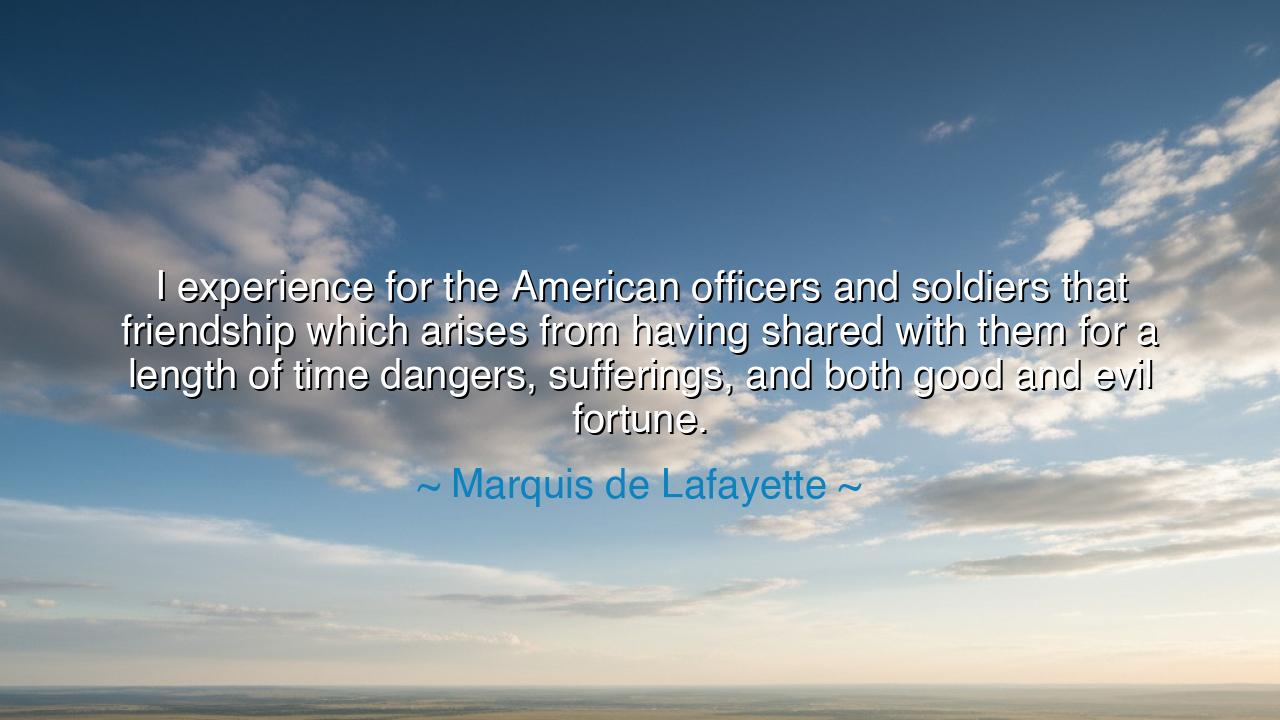
I experience for the American officers and soldiers that
I experience for the American officers and soldiers that friendship which arises from having shared with them for a length of time dangers, sufferings, and both good and evil fortune.






In the immortal words of the Marquis de Lafayette, that noble son of France and adopted child of America, we hear a voice that bridges two worlds and two hearts: “I experience for the American officers and soldiers that friendship which arises from having shared with them for a length of time dangers, sufferings, and both good and evil fortune.” These words are not merely the recollection of a soldier—they are the confession of a soul that has known the sacred fire of brotherhood, kindled in the crucible of shared struggle. In this single sentence, Lafayette reveals the essence of a friendship not born of comfort or leisure, but forged in the fires of adversity, sealed by courage, and hallowed by sacrifice.
To understand his words, one must recall the storm of the American Revolution, when the young Marquis—barely in his twenties—left the opulence of Versailles to fight for liberty in a foreign land. Against the counsel of his elders and the safety of his station, he crossed the ocean not for wealth or fame, but for freedom. It was among the ragged soldiers of Washington’s army that he found his truest companions. Together they endured the biting cold of Valley Forge, the smoke and roar of Brandywine, the despair of defeat, and the exaltation of triumph. In their shared hunger, their laughter amidst ruin, and their unyielding belief in a cause greater than themselves, Lafayette discovered what he calls “that friendship”—a bond deeper than blood, one that only danger and suffering can reveal.
This is no ordinary friendship, for it is born not of convenience, but of struggle. When men stand shoulder to shoulder against death, when they bear each other’s burdens in the hour of trial, the walls of self crumble, and the soul learns what it means to belong. Such friendship is a covenant written not in ink, but in sweat and tears. The ancients called it philia, the brotherly love of comrades who would die for one another. It is the same spirit that bound the warriors of Sparta, the legions of Rome, and the freedom fighters of every age. Lafayette’s words remind us that such bonds cannot be formed in comfort—they are the child of shared fate.
Consider also the tale of Ernest Shackleton and his crew, who ventured into the frozen heart of Antarctica in 1914. When their ship, Endurance, was trapped and crushed by the ice, they faced death on every side—hunger, cold, despair. Yet through it all, Shackleton stood beside his men, and his men stood beside him. Not one life was lost, for they refused to abandon one another. In the desolate whiteness of that endless night, friendship became their salvation. Like Lafayette and his brothers in arms, they learned that true companionship is not measured by laughter in times of ease, but by loyalty when all seems lost.
The meaning of Lafayette’s words reaches beyond the battlefield. It speaks to all who walk through hardship together—families weathering storms, workers striving toward a shared dream, friends who stand by one another in grief and joy alike. The bond formed in such moments is not easily broken. It is tempered like steel—stronger for having endured the flame. In a world often driven by shallow acquaintance and fleeting connection, his wisdom calls us back to a purer form of friendship: one proven by shared endurance, not by convenience.
There is also humility in his confession. For though Lafayette was a nobleman, he did not speak of commanding soldiers, but of sharing their dangers and fortunes. He saw himself not above them, but among them. That humility is itself a lesson: friendship cannot exist where pride rules. The heart must kneel before another’s pain, must listen, must walk beside. Only then can it know the depth of love that grows from shared labor and mutual respect.
And so, dear listener, learn from Lafayette’s sacred bond. Seek not friends only for comfort or pleasure, but those who will stand with you through both good and evil fortune. Be the kind of soul who enters another’s struggle without hesitation, who lends strength without asking reward. When hardship comes—and it will—do not run from it. For in hardship lies the forge where true friendship is made. Walk into it with courage, and when you emerge, you will not be alone; you will carry within you the unbreakable chain of fellowship, the same that bound Lafayette to the soldiers of liberty.
Thus remember: friendship is not a gift given—it is a bond earned. It is not the laughter of feasts, but the silence of shared endurance. Cultivate it through loyalty, humility, and courage, and one day, like the Marquis de Lafayette, you too may look back upon the battles of your life and say with a full heart, “I have known friendship that time and fortune can never undo.”






AAdministratorAdministrator
Welcome, honored guests. Please leave a comment, we will respond soon